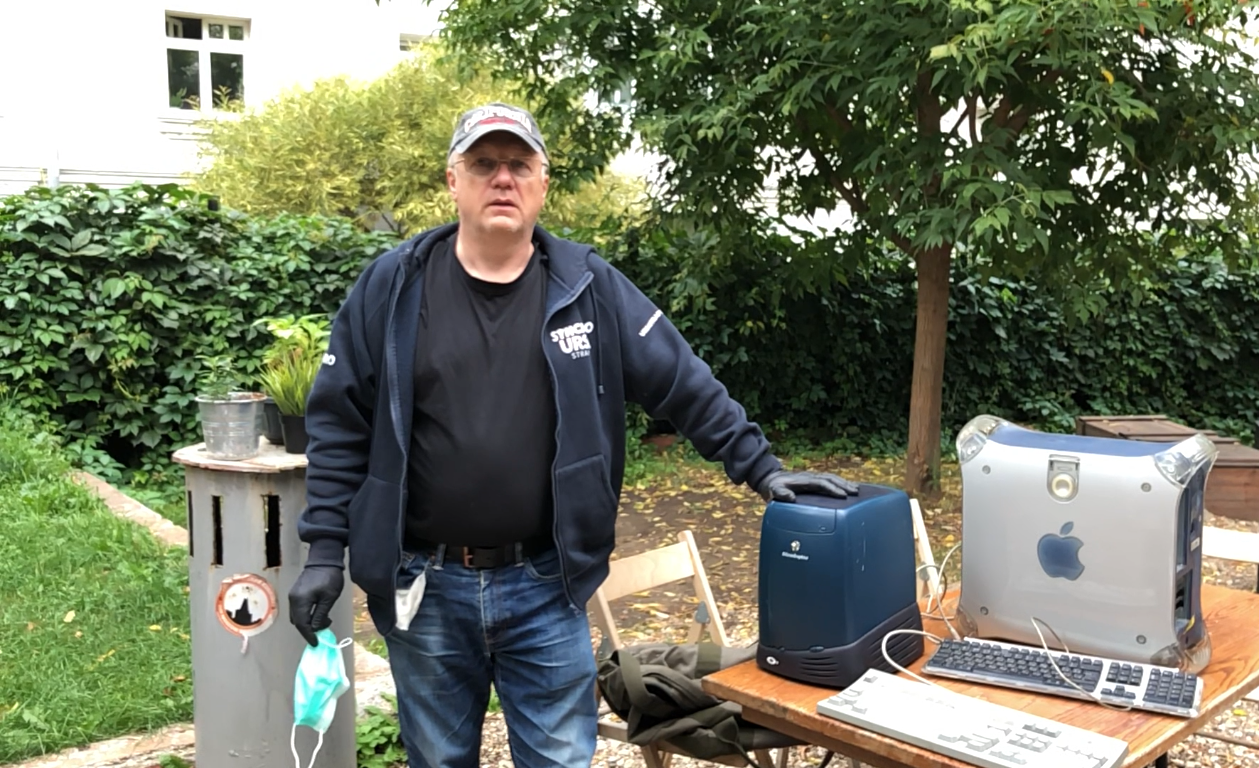
Co-author of the books “And I Was in a Computer City” and “Professor Fortran's Encyclopedia” donated two computers from the 1990s that have become rarities to the DataArt IT Museum: an Apple Mac in perfect condition and an O2 Silicon Graphics graphics station. And in a new interview with our museum project, he spoke about the video card in a backpack with canned meat, the times of bans on the import of strategic electronics into the USSR, a satellite forgotten in orbit, and an amazing trip to London.
- Is it true that you were the first to bring a graphics card with a video output to the USSR?
- Yes, I was the first among the first with the video output card. Back then, there was only one PC card with a composite video output, and it was produced by a tiny company called Vine Micros in the UK. Serious graphics were then done on specialized graphics stations from Silicon Graphics, which in terms of computing power relative to a PC could be called supercomputers. Well, they cost, respectively, and even were prohibited from being imported into our country.
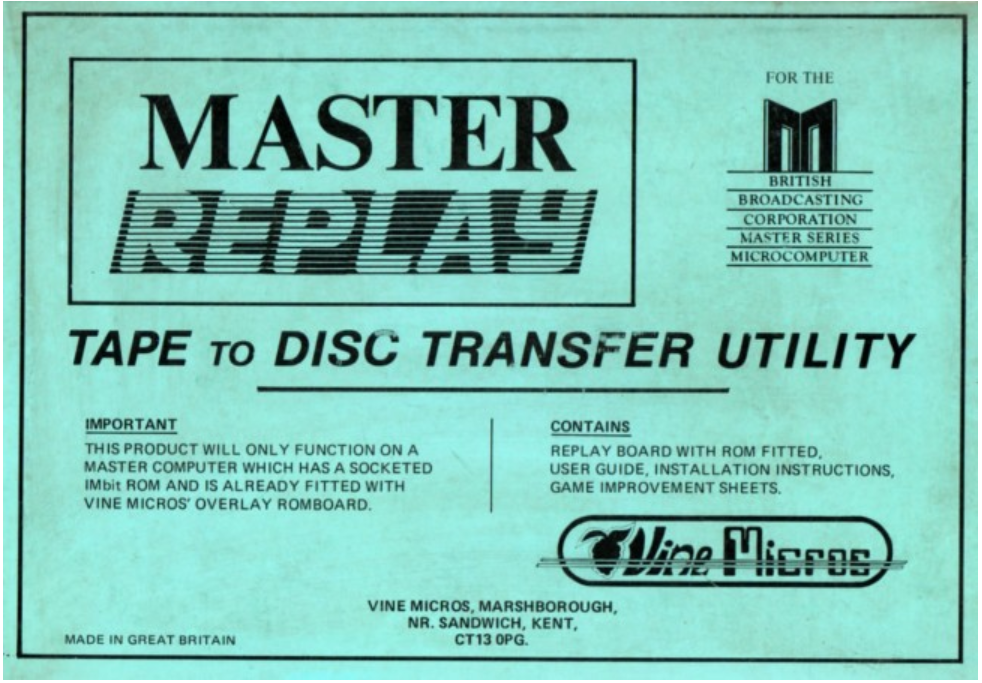
1980- Vine Micros , , , , . Master Replay BBC Micro
But let's take everything in order. This story happened at the turn of the eras, when the Soviet Union was falling apart, fax was a luxury, and there was no internet at all. But there was enthusiasm, youth, pressure and a great desire to engage in computer graphics. By today's standards, this is comparable to the idea of flying to Mars on a one-way ticket. A friend of mine was writing a CAD graphic editor at the time in a mysterious joint venture seemingly run by a Cypriot communist. He was the only one who had a full licensed Borland Turbo C with documentation, bought by the office for currency. A good friend copied and generously distributed software to all his friends and acquaintances, who then worked on broken cut-down assemblies and without documentation.
At that time, the Export Control Coordinating Committee was still operating, uniting 17 countries and compiling lists of strategic technologies not subject to export to the countries of the "Eastern Bloc". The 386 processors also fell under the bans of COCOM or CoKom - it was forbidden to import them into the USSR. Nevertheless, the processors were still imported through third countries. As we know from the works of the classics of Marxism-Leninism, "there is no such crime that the capitalist would not commit if his profit exceeds 100%." The quote is not accurate, since I passed the foundations of Marxism-Leninism a very, very long time ago, when I was studying at the MEPhI at the Faculty of Theoretical Physics.
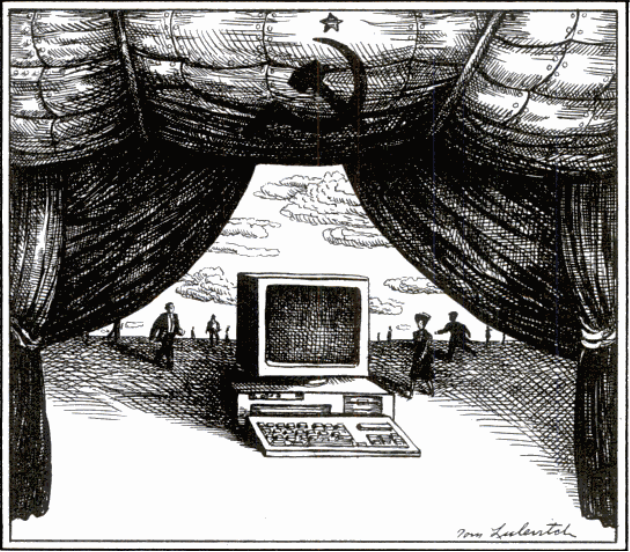
Illustration for a column welcoming the George W. Bush administration's plans to ease export restrictions to Eastern Bloc countries.Computerworld magazine, 1990
Prohibited processors and components bypassing COCOM came to the USSR through India. On their basis, computers were assembled here, in the depths of various joint ventures, original software was written for DOS, thanks to which our "products" jumped, flew, swam and intercepted the "products" of a potential enemy. Nimble Indian businessmen on computer smuggling at that time amassed millions of fortunes, relaxed, lost vigilance and left the country for the West in order to spend "dishonestly earned by easy labor." Upon arrival, the special services knitted them right on the plane ramps. I still remember a British newspaper with a photo on the front page, where an Indian friend of mine (he drove into our office with tempting offers) was handcuffed at Heathrow Airport. Now the phrase "sit down at the 386th processor" sounds absurd,but the computer smugglers who got under the distribution then, who sat down for 6-8 years, were not at all funny.
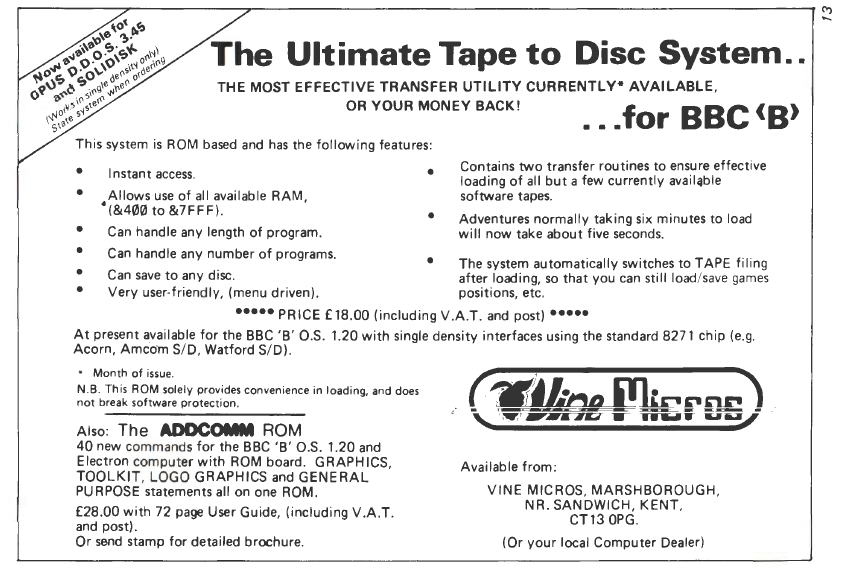
Vine Micros Electron & BBC Micro user show, 9–12 1985
— Vine Micros. — , Apple?
- Apparently, yes, but then we perceived it differently. It seems to me that for Russians everything connected with alcohol, wine and other alcohol is sacred. The experience of communicating with scientists in Soviet laboratories suggested that any our scientist, no matter what he was doing - artificial diamonds or growing crystals for microelectronics - on the eve of the birthday of any of the colleagues from improvised materials could easily assemble a moonshine still, and after the celebration, turn it back into a vacuum setup for experiments. And this picture with grapes on the logo of a company created in a British garage clearly said that "our man" was sitting in Kent. He took wine on his chest, scratched his turnips, took the EGA board, reprogrammed the chip, then worked with a soldering iron and pulled the video signal out of the board.Now you can connect a VCR and write graphics to it in real time. Yes, EGA is few colors, yes, low resolution, but it's better than nothing at all. Although the board was made at an amateur level, the low price and the ability to put a creeping line on a TV picture opened up huge opportunities for the same TV commercial. A full-color graphics station from Silicon Graphics cost like an expensive car, and a Vine Micros board cost like a tiny piece of that car.A full color graphics station from Silicon Graphics cost like an expensive car, and a Vine Micros board cost like a tiny part of that car.A full color graphics station from Silicon Graphics cost like an expensive car, and a Vine Micros board cost like a tiny part of that car.
- This scarf did not fall under the ban of COCOM?
- Of course not. The main thing was not to call it a converter. The converter is already a hint of military use. At that time there were cases (and they still do) when soldiers mistakenly shot down civil aircraft. Either because of a malfunction in the recognition system "friend or foe", or because of operator error. Each such story had a great political resonance: there were international investigations, the families of the victims were entitled to millions in insurance payments. Most interestingly, it was not completely clear how and why this happened. To understand, apart from the explanations of all the participants, it was necessary to look at the images on the screens and understand how the operators interpreted them.
At the request of the military in England, a certain company under the leadership of the mysterious Mr. Winter began to make video converters for recording images from a monitor to a VCR. There was such a piece of iron as a sports car, but the warriors did not spare money. I'll tell you more about how I met Mr. Winter, but for now let's get back to the story with Vine Micros. According to information from a computer magazine received in the mail, their handkerchief with video output cost as much as 199 pounds sterling. I went with the magazine to the management of the joint venture where I worked at the time, asking for £ 200 for the purchase. Earlier I was repeatedly refused, and the commercial director wrote resolutions on my memos: “I don't see the market. Don't give money to "multicams". The commercial department called our small group of software writers "cartoons" - that's how they definedwhat we do in their office. I decided to make a knight's move and went to an appointment with the most important thing at the enterprise - the General Director. An interesting dialogue took place between us:
- Well, how much is your board worth? The boss asked lazily.
- 199 pounds! I blurted out. - I don’t need money for living - I’ll stay with my English friends. And no need to take the metro - I'll walk. You only need 199 pounds to buy the board and the cheapest ticket to London and back. I have a British visa.
- Are you going to feed on the holy spirit? - asked the boss and took a sip of coffee.
- These are my problems, - I answer. - I will bring stewed meat and condensed milk with me, I will eat canned food.
The conversation about canned food broke the boss's buzz from the aroma of expensive coffee. He made a grimace of disappointment and looked into my eyes for a long time with a dim, unblinking gaze. I waited in suspense - either they would be fired for arrogance, or they would give me money.
Finally, the boss made a decision: “I will now call the accounting department to arrange a business trip for you, buy air tickets and give you £ 200 in hand. You will bring the checks and report. Well, bring a present for my secretary from London. Does this option suit? "
- Very happy! - I exclaimed and happily ran to the accounting department.

Adeksandr Trukhanov's business card, early 1990s. Please note that there is no email yet, but a telex is specified
Later it turned out that the bored chef just decided to have fun and arranged a sweepstakes on the theme "Will Sasha return from England or stay there to be homeless." Betting around the boss. They bet mainly on the "homeless". Nobody seriously hoped for my return, and even with a fee. A special chic in the combination of the boss was the Aeroflot ticket issued to me - with an open date and in business class, "so that I would not deny myself anything." Well, 200 pounds in my jeans pocket for everything, including the fee. At the very beginning of the 1990s, I had a real quest called "Survive, Buy and Return".
- Well, how did you manage the task?
- Not without costs, but I did it. I flew to London with a backpack full of cans of army stew and condensed milk. There were also two packs of Cosmos cigarettes to facilitate contact with the local population (I myself do not smoke) and a FED camera for exchange for pounds sterling in a thrift store opposite the BBC building. I stayed in an apartment rented by my British friends. The friends themselves went to other friends, and they settled me in an empty room. The company in the two-story house was worthy: a young cameraman from the local 4th channel and a photojournalist from Australia with a friend, who received a permit to work in the UK for two years. The first thing they showed me was their food in the fridge. They explained that they do not pretend to my stew, but they also ask not to reach for their yoghurts. And the rest is "peace, friendship, gum."I gave them a pack of "Cosmos" and a set of badges with the image of Lenin in an assortment: Lenin small (October badge), Lenin young (Komsomol) and Lenin mature (leader profile with the signature "KPSS"). The guys refused Lenin and the cigarettes - in their opinion, Ilyich's reputation is too dubious, and the Cosmos cigarettes are too strong. They asked to change the gifts for a badge with Yuri Gagarin - the first cosmonaut aroused indescribable delight in them and went with a bang. Soon the stocks of badges with Gagarin in my bins ran out.They asked to change the gifts for a badge with Yuri Gagarin - the first cosmonaut aroused indescribable delight in them and went with a bang. Soon the stocks of badges with Gagarin in my bins ran out.They asked to change the gifts for a badge with Yuri Gagarin - the first cosmonaut aroused indescribable delight in them and went with a bang. Soon the stocks of badges with Gagarin in my bins ran out.
Compatriots came to the Australians in the evenings. They smoked strange cigarettes that made their heads ring, drank beer and talked about life in the UK. I entertained them with anecdotes about the Soviet intelligence agent Stirlitz and his adventures in Nazi Germany. Especially popular was the episode when Stirlitz walked through the night in Berlin, and prostitutes walked towards him. "Prostitutes" - thought Stirlitz. "Stirlitz" - thought the prostitutes.
This multi-layered story was akin to a kind of British humor, and the Australians loved Stirlitz. Most of them had work permits for two years. Made money in England - and blow back home to your Australia. Actually, the Australian hangout helped me buy a fee. Among them, a couple of Russian Australians were discovered who had arrived from Sydney to London as tourists. Their grandmother Dunya emigrated to Australia during World War II, and they spoke Russian almost without an accent. Everyone understood that I would not go back without payment - "Russian computer fanatic!" - I have no money for the trip, as well as a bank account to pay.

Judging by the address, this is what the office of Vine Micros in Kent looked like. In 2004 it was acquired by tvONE Corporation along with the rights to CORIO technology.
But the guys had a tour of Great Britain just passing through Kent. I gave them my hard-won 200 pounds, and a week later they returned with the coveted payment. It turned out that £ 199 is the price without WAT, and the Australians also had to pay their hard-earned money. I tried to give them something as a thank you, but they said "forget it!" refused. All the same, Russians - they are Russians in Australia, for which many thanks to them. I returned to Moscow happy, albeit slightly socially worn out.
- Have you brought a present for the boss's secretary?
- The secretary is not, but brought the boss. Walking around Soho among outlandish sex shops for a Soviet man, I came under an advertising campaign: upon learning that I was from Moscow and came “on business,” an African-British seller appreciated my interest in advanced sex technologies and presented a set of black condoms with either mustache , or with pimples. I took a business card from him and promised to buy a large batch in case of successful testing. I presented a unique product for those times upon my return to the boss. He was surprised three times: and my return with a fee, and the fact of the gift, and the gift itself. After that, the confidence in my ideas increased dramatically. They began to invite me as an interpreter to meetings with foreign visitors. Sometimes such negotiations took place in a bathhouse with vodka and brandy.Once the authorities, in a state of good drinking, almost sold to the bourgeois a satellite, already decommissioned, but still dangling in orbit. With difficulty he dissuaded them, but, as usual, they made me an extreme: "You translated the satellites to the English in the bathhouse, so deal with them yourself ..." When I read that a lunar rover was sold to some western gentleman. satellite of the Earth, was not at all surprised - he himself participated in a similar one.
— , ?
- There was no money not only for the metro - there was none at all. I walked to the center of London from the Balem station where I lived through the Indian area. There were saris and turbans everywhere. It took me two hours to get to Big Ben. Once I was surrounded by London hooligans in the side streets, trying to run over, intimidate and take away the money. The British punks then put on heavy boots with metal horseshoes to kick the victims. I did not understand their slang, did not react to threats and remained calm - that is, I did not fit into the usual image of the victim. And for my 199 pounds to buy a board, I would fight for life and death. And if you consider that as a schoolboy I studied judo at almost the only specialized sports school in the USSR in the city of Elektrostal (then in the Soviet Union, sambo was mainly widespread),and in his student days he attended a semi-legal karate section in the MEPhI hostel, then the punks were in for a lot of surprises. Apparently, the leader of the Gopniks felt it and, having stopped threatening, asked: "Where did you come from?" "I am from the Soviet Union," - I answer and show the badge with Lenin. "This is for your memory." Here the gopniks were confused. Apparently, they remembered the then popular action movie "Red Heat" with Schwarzenegger in the role of a Soviet policeman. Remembered - and shouting "Get out of here!" disappeared into the alleyways.remembered the then popular action movie "Red Heat" with Schwarzenegger in the role of a Soviet policeman. Remembered - and shouting "Get out of here!" disappeared into the alleyways.remembered the then popular action movie "Red Heat" with Schwarzenegger in the role of a Soviet policeman. Remembered - and shouting "Get out of here!" disappeared into the alleyways.

, 1980-
In general, there were many funny episodes in my hiking trips in London. Once I was sitting on a bench overlooking Big Ben and had a leisurely conversation with a British pensioner who sat down next to me. The old man asked where I was from, and when he found out that I was from Moscow, he gave an amazing phrase: “Oh! I heard you have big problems there - there are no fresh oranges in the stores! " I really wanted to shout: “Grandfather, what other fucking oranges! We don't have a shit in the stores at all! " But he restrained himself. Then the pensioner pushes me to the side and points to a young couple heading towards our bench: “Look, look, Alex! They are Americans. Now they will ask what the river is called and what kind of building it is. " "So this is Big Ben!" - I was surprised to the core. "How can you not know this!" “The Americans are still. There is a lot of money, but they don't know a fig. That's why we don't love them, ”the old man grumbled.- Now you will explain to them that Big Ben is Big Ben and the Thames is the Thames. Then they will start asking where you can buy tea in a tin box shaped like a London telephone booth and a souvenir guardsman in a bear hat ... ”. I replied to my grandfather that, of course, I would answer about the Thames, but about tea and souvenirs, let him explain it himself. On that and decided.
Americans come up to us: “Hello! What is the name of this building? " “This is Big Ben,” I start laughing nervously. - River Thames, and where to buy souvenirs, your grandfather will explain to you better ... »
- We just walked without money - you couldn't get to museums or movies?
- Why, I was even at a concert of avant-garde music. Free rider, of course. A guy-cameraman who lives in the same house as me, his father turned out to be an avant-garde composer. One day a guy took me with him to the premiere. A taxi pulls up, my British friend comes out in a tailcoat with a bow tie, his girlfriend is in an evening dress ... and I am in fresh jeans and a wrinkled T-shirt with the emblem of the 1980 Olympics. It was lucky that to save me at the theater, we were joined by another marginal, an unemployed friend of the composer's son, “looking for himself”. Also in jeans and a wrinkled T-shirt.
The gentlemen went to the box, and we were shown the seats in the stalls with signs "reserved". They sat down. We have no tickets, no counter-tickets, nothing at all with the “looking for himself”. Around are gentlemen in tailcoats and ladies in evening dresses. I got the feeling that we are sitting in strange places. And I'm not alone. An elderly and elegant, like a piano, gentleman comes up to us and shows us his tickets. With him is a lady with a stunning choker around her neck. “Seeking himself” begins to confusely explain that we are creative youth who arrived at the invitation of the Composer Himself, and next to him sits a person who has specially arrived for the premiere from Moscow. They listen to him politely, but do not believe. They are about to be driven away. Here the instinct of self-preservation works in me - I stand up to my full height, bow and introduce myself: "Tchaikovsky is from Moscow, friend of the composer's son." The gentleman was confusedmuttered something about "Swan Lake", progressive youth and left with the lady. Later, the administrator put them in other places. It was probably considered bad form in British musical circles to banish Tchaikovsky, even with the prefix “pseudo-”.
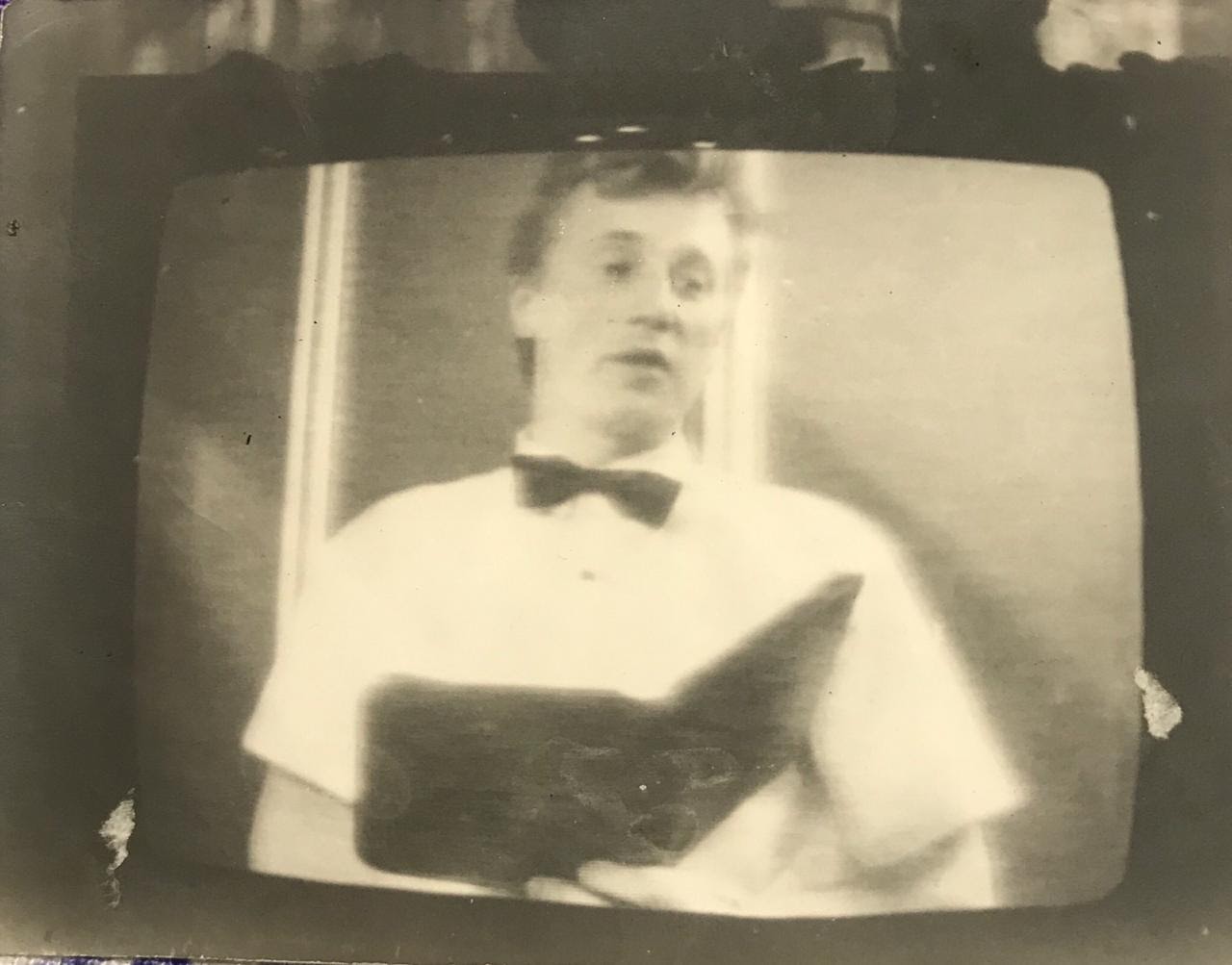
, . . « - ( ) „ - -… “. , „“, , — , . : „ !“. : „ - , “. , ...»
— ?
- You may get the false impression that it was easy - flew at your leisure to London for a fee, walked, dispersed. It was actually pretty tough. It's good when you have a roof over your head, but when there are no coins even for coffee, it becomes not only hungry, but also sad. Saved by enthusiasm and commitment. These qualities turned out to be more expensive than money, which was not available. It was they, coupled with faith in themselves, who helped to fulfill the mission, in the success of which no one believed. Except for myself, of course. I was brought up on Soviet songs and sincerely believed that "we were born to make a fairy tale come true, to overcome space and openness." I overcame it: I wrote a book with Andrei, and with a negative balance in my pocket I managed to bring a video card from London. To be fair, I note that I got the hang of coffee in offices in Soho,where I went to get acquainted with new technologies. There it was offered for free.
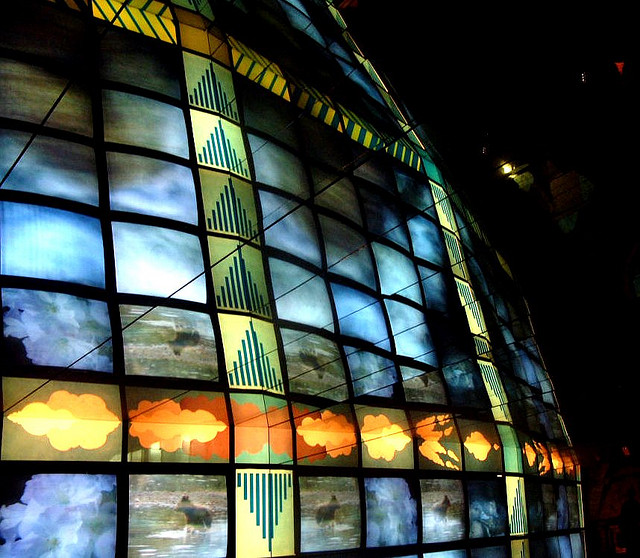
A video wall at the Natural History Museum in London, built with Memotech technology under the direction of Brian Pipe
In one of the companies in Soho, I met Brian Pipe, who built video walls from electric ray tubes (LCD was not yet invented). It turned out that his wife Lisa had previously studied Russian. Several times they fed me in restaurants, for which many thanks to them. My British friends also tried to help - they agreed with friends in the Russian Air Force about my visit to the "nest of anti-Soviet propaganda." I visited Bush House and for a modest fee gave a couple of interviews under the pseudonym Vedernikov. He talked about life in Moscow, answered topical questions.
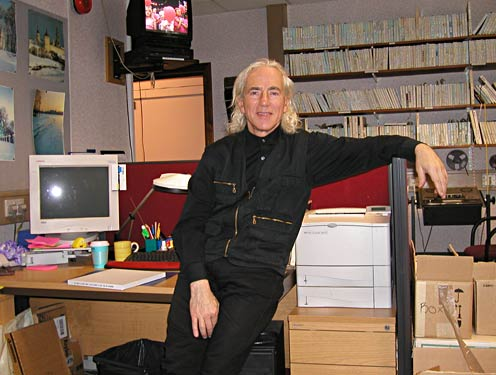
Seva Novgorodtsev at the BBC office in the famous Bush House in central London, however, already in the early 2000s. BBC World Service moved from Bush House in 2012. Photo source
After one of these interviews, a certain Seva (but not Novgorodtsev, he worked in another department) said: “Listen, Sash, we have a confusion here: the interview was broadcast under your real name. I understand that there may be problems upon returning to Moscow, but excuse me ... ”I tensed, immediately demanded from Seva political asylum with a bed right in his office and work for the Air Force for food. Seva patted me on the shoulder and said he was joking. And he added that it is easy to love Russia, especially when you live in London. I replied that I was joking too, but the adrenaline in my blood raged for a long time.
— Silicon Graphics O2. ?

O2 Silicon Graphics 1996 Indy. Ee
“These are echoes of the old story with the graphic workstations of Silicon Graphics. At that time, there was no decent graphics on the PC due to the low power of the processors, and the interested structures used "supercomputers" from SGI - Octane or more affordable Indigo. But they were all very expensive. O2 budget stations appeared later. You can guess which structures consumed Silicon Graphics products from the aviation simulator installed on your O2. In addition to the military, aerospace engineers and nuclear physicists, TV and filmmakers could afford a small number of SGI stations. In one of the studios in Soho (this is where the graphic studios in London were located) I was shown a film of footage from The Terminator. And they gave me a powerful magnifier so that I could see the discrete graphics. In the shot where the killer robot emerges from the flames,the resolution is about 300 by 200, but the fragment with the special effect lasted for about a second. During this time, the human eye does not have time to notice the discreteness. All this was shown to me by an engineer who wrote a program for interpolation (stretching) of a frame calculated on "silicone" to cinematic resolution. Then on a special device there was a frame-by-frame reset - the image from the graphics station was recorded on film. The process was not quick, but then there was no other.The process was not quick, but then there was no other.The process was not quick, but then there was no other.
Most likely, Alexander recalls this fragment of the film "Terminator 2"
- SGI stations fell under COCOM bans? Couldn't Soviet filmmakers count on them?
- Yes, because of our realities. The stations, supposedly bought for the cinema, then mysteriously ended up in some closed scientific town. I know one such story: the USSR collapsed, all around a mess. And then a fax from a certain Russian structure comes to the SGI office, let's call it a nuclear power plant: “Your computer is out of order. How can we fix it? "
Everything is like in a Soviet joke: an American spy plane photographed a peaceful Soviet tractor plowing a field. Our peaceful tractor responded to the unfriendly act of the reconnaissance aircraft with a salvo of surface-to-air missiles.
Having received a request from the nuclear power plant, the bourgeoisie tensed, asked for the serial number of the product and went to the seller. True, he argued that everything was wrong about the nuclear power plant. By the way, I was personally acquainted with him - we started doing graphics at about the same time. Of those enthusiasts, almost no one is left alive.
We were the first who managed to obtain a license in the UK for the import of four SGI graphic stations for television and film production into Russia (in the USA this was basically impossible). It was already easier for those following us - a precedent was created. So, the seller swore and swore that he did not know about any nuclear power plant, but sold Octane to a certain bureau to design agricultural machinery or something like that. There was a trial in Europe, but it seems then the guy managed to fight back. Or maybe that very "agricultural structure" helped him fight back. It is clear that this is a dark matter - we will assume that all these are rumors and not true. There were COCOM sanctions, and there were those who bypassed these same sanctions. The age-old competition between bullets and armor. But, as they say, there are no others, and those are far away.

Checkpoint is quite suitable agricultural enterprise. Still from Karen Shakhnazarov's film "City of Zero", 1988
- How did you get the import license?
- The mysterious Mr. Winter, who produced video converters for the needs of “theirs” government agencies, helped us in this. I met him quite by accident. When I came to London to pay for Vine Micros, I visited a couple of bookstores and copied the phone numbers of computer graphics offices from magazines. So he went out to Mr. Winter. He was a man with connections in aerospace, banking, and telecommunications. Now he could be called an investor in the field of new technologies. He was a smart little man.
It was he who introduced me to the people from SGI, he also organized the receipt of the license. At first everything went well: the necessary letters and guarantees were provided, the license was received, the order was paid for, the computers were shipped. It seems everyone is happy, but no - after a while a fax comes from Mr. Winter demanding to pay him a decent amount over and above the contract. You see, he had legal problems because of the license he received. I had to spend money on lawyers, and even pay some kind of fine. Then we answered him that no one would give us money in excess of the contract, but if the situation is critical for him, we can sell computers at a high price not to television people, but to some nuclear power plant and thus compensate him for fines. Mr. Winter tensed, declined the claim and did not ask for anything more from us.
By the way, my contacts with SGI, many years later, suddenly surfaced at the British Embassy. I applied again for a visa, handed over the documents. They called me to the window, and the consular officer, without batting an eye, said: "We cannot find your documents."
- How can you not find it? - I am indignant. - An hour ago I handed them over to the next window ... And my passport also disappeared ?!
- And we can't find the passport.
- How is this even possible ?! - I was at a loss. - What is this mess here?
Suddenly, a man in the window asks me a question: "What did you do in London in such and such a year?"
I was even more confused: “I came as a tourist, walked, watched, had fun. What's the matter? "
- According to our information, you met with a representative of Silicon Graphics and came to London at the invitation of SGI.
- Yes, I not only met with the person from SGI. I also went to the Double Positive studio and helped a producer from Moscow with the translation. But that was only on the first day of my visit. Then I walked all week, looked at the sights and had fun.
The officer in the window silently thrust the passport into my hands and left. The passport was mine. I flipped nervously through the pages and found a fresh British visa. Well, artists! Tried to breed like a rabbit! First, they brought me out of the state of mental equilibrium with a lost passport, then they suddenly asked an interesting question. They needed to know what I remember about meeting SGI. I don't remember anything. I don’t remember talking with an SGI employee about the structure of their supercomputers and about high-speed storage arrays. With regard to special effects in movies, of course. Apparently, that technology had other applications, which I also do not remember. And I'm not going to remember even after many years.
By the way, the SGI O2 station with a flight simulator transferred to your museum has a proper name: her name is BRAVO! A long time ago I gave the station to my good friend Dmitry Guslinsky, a specialist in the field of film production. Dmitry kept it with him for almost 15 years! Fifteen!!! Received against signature - returned against signature. The O2 is still in working order and with the original keyboard. The fact itself is admirable, for which many thanks to Dmitry. This story once again confirms that the main asset of our country is the amazing people living in it. Well, we will get the necessary equipment one way or another.
- Transferred to the Museum Mac also with history?
- We used it for a rough cut, looked at the footage on it. At some point we created a computer graphics studio BEE EYE ("Bee's eye") with the participation of Dima Dibrov. In that studio, the first Russian commercial was created with the imposition of three-dimensional computer graphics on the video image: in the frame around the still young Konstantin Raikin, a candlestick modeled on a computer with burning candles was flying, lightning flashed in the air, thunder rumbled. The project was directed by a man who is now so famous that I will not mention his name.
Sergey Minaev's video clip for the song "Voucher", made by the Bee Eye studio
Rare computers have gone to our collection, and we hope to continue talking with Alexander about the amazing time of "Professor Fortran" creation.